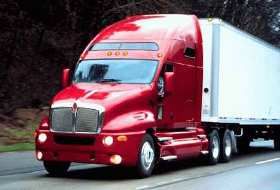A Few Questions Before I Take The Plunge
Topic 3407 | Page 1
Since i am fresh out of school i will have to say yes it is very intimidating! the courses here are a great start and will help you all the way through your schooling or program...also the school you go to will break it all down for you.. its alot to learn but it is very rewarding. 3 weeks ago i had no idea what a control arm mount was lol... today i can run off indianas whole pre trip, tug test, and 4 point in under 20 minutes! LoL... study and study more! its fun and most of all rewarding .. good luck to you!

Oooooo . . . talk about loaded questions . . . you will get the REAL skinny here so be prepared to change much of your preconceived notions . . . The High Road Online CDL Training Program is all the information you need (plus more) to get completely through ANY state DOT/DMV testing regimine . . . get started ASAP and be consistent and thorough and it will pay off in dividends for your effort . . .
Jopa

CDL:
Commercial Driver's License (CDL)
A CDL is required to drive any of the following vehicles:
- Any combination of vehicles with a gross combined weight rating (GCWR) of 26,001 or more pounds, providing the gross vehicle weight rating (GVWR) of the vehicle being towed is in excess of 10,000 pounds.
- Any single vehicle with a GVWR of 26,001 or more pounds, or any such vehicle towing another not in excess of 10,000 pounds.
- Any vehicle, regardless of size, designed to transport 16 or more persons, including the driver.
- Any vehicle required by federal regulations to be placarded while transporting hazardous materials.
SAP:
Substance Abuse Professional
The Substance Abuse Professional (SAP) is a person who evaluates employees who have violated a DOT drug and alcohol program regulation and makes recommendations concerning education, treatment, follow-up testing, and aftercare.
DOT:
Department Of Transportation
A department of the federal executive branch responsible for the national highways and for railroad and airline safety. It also manages Amtrak, the national railroad system, and the Coast Guard.
State and Federal DOT Officers are responsible for commercial vehicle enforcement. "The truck police" you could call them.
Dm:
Dispatcher, Fleet Manager, Driver Manager
The primary person a driver communicates with at his/her company. A dispatcher can play many roles, depending on the company's structure. Dispatchers may assign freight, file requests for home time, relay messages between the driver and management, inform customer service of any delays, change appointment times, and report information to the load planners.DMV:
Department of Motor Vehicles, Bureau of Motor Vehicles
The state agency that handles everything related to your driver's licences, including testing, issuance, transfers, and revocation.

Don't worry about falsifying any log books. You can be 99% certain you will be on electronic logs. A computer will be tracking your hours. No cheating that log book.
But to answer your question back in the day when I first started driving you only got paid for the miles you ran. The pay is not based on your log book at all. It's strictly miles the truck turns.
And follow the link Jopa gave you the the High Road CDL study guide. Even a mentally challenged cross eyed mix breed alien humanoid dog can pass their cdl test and long as you can read English you can pass it.
CDL:
Commercial Driver's License (CDL)
A CDL is required to drive any of the following vehicles:
- Any combination of vehicles with a gross combined weight rating (GCWR) of 26,001 or more pounds, providing the gross vehicle weight rating (GVWR) of the vehicle being towed is in excess of 10,000 pounds.
- Any single vehicle with a GVWR of 26,001 or more pounds, or any such vehicle towing another not in excess of 10,000 pounds.
- Any vehicle, regardless of size, designed to transport 16 or more persons, including the driver.
- Any vehicle required by federal regulations to be placarded while transporting hazardous materials.
Electronic Logs:
Electronic Onboard Recorder
Electronic Logbook
A device which records the amount of time a vehicle has been driven. If the vehicle is not being driven, the operator will manually input whether or not he/she is on duty or not.

Logs are about time not miles. I had no way to falsify logs if I moved the truck I would go into violation if I were out of hours. Do it twice in a year and I'd be looking for another job. That's Sygmas policy anyway, not sure how other companies handle it.
TWIC:
Transportation Worker Identification Credential
Truck drivers who regularly pick up from or deliver to the shipping ports will often be required to carry a TWIC card.
Your TWIC is a tamper-resistant biometric card which acts as both your identification in secure areas, as well as an indicator of you having passed the necessary security clearance. TWIC cards are valid for five years. The issuance of TWIC cards is overseen by the Transportation Security Administration and the Department of Homeland Security.
Yap, our High Road Training Program has the entire CDL manual built right in and broken down into short segments with questions after each section. It also asks you review questions from previous pages as you work your way through to really help you retain that information - and it does an awesome job of it. That program is highly effective.
Here's a breakdown of the different sections of our online training program and what they apply to:
To Get Your Permit:
- Rules & Regulations
- Driving Safely
- Transporting Cargo Safely
- Air Brakes
- Combination Vehicles
- Pre-Trip Inspection
- Driving Exam
The main sections for your endorsements which are optional but we highly recommend you get:
- Transporting Passengers
- Doubles And Triples
- Tankers
- Hazardous Materials
And two sections we've built ourselves with info you'll need for everyday life on the road but the manual doesn't really cover it:
- Logbook
- Weight & Balance
Pre-trip Inspection:
A pre-trip inspection is a thorough inspection of the truck completed before driving for the first time each day.
Federal and state laws require that drivers inspect their vehicles. Federal and state inspectors also may inspect your vehicles. If they judge a vehicle to be unsafe, they will put it “out of service” until it is repaired.
CDL:
Commercial Driver's License (CDL)
A CDL is required to drive any of the following vehicles:
- Any combination of vehicles with a gross combined weight rating (GCWR) of 26,001 or more pounds, providing the gross vehicle weight rating (GVWR) of the vehicle being towed is in excess of 10,000 pounds.
- Any single vehicle with a GVWR of 26,001 or more pounds, or any such vehicle towing another not in excess of 10,000 pounds.
- Any vehicle, regardless of size, designed to transport 16 or more persons, including the driver.
- Any vehicle required by federal regulations to be placarded while transporting hazardous materials.
Logbook:
A written or electronic record of a driver's duty status which must be maintained at all times. The driver records the amount of time spent driving, on-duty not driving, in the sleeper berth, or off duty. The enforcement of the Hours Of Service Rules (HOS) are based upon the entries put in a driver's logbook.
Combination Vehicle:
A vehicle with two separate parts - the power unit (tractor) and the trailer. Tractor-trailers are considered combination vehicles.
Doubles:
Refers to pulling two trailers at the same time, otherwise known as "pups" or "pup trailers" because they're only about 28 feet long. However there are some states that allow doubles that are each 48 feet in length.

Your questions kind of reminded me about a preconceived notion a lot of people may have and an important question you should be asking recruiters. Miles as far as what is recorded and counts for any goals as well as what you get paid for are not the miles on your odometer. Some companies pay all dispatched miles. Some only pay the miles you are under a load. Some use the household movers guide to derermine how miles a trip is. Some pay the actual distance between the two points and some pay practical miles. Practical miles will be very close to the actual mileage if you stay enroute. No company pays the actual odometer miles because you may decide to go 25 miles out of the way to see your girlfriend in Terra Haute and then 25 miles back to the route. That's 50 miles you're not (and shouldn't) paid for. Luckily for you and you're Indiana girl you can still do this though.
New Reply:
New! Check out our help videos for a better understanding of our forum features

















Preview:








 TT On Facebook
TT On Facebook
I've decided after months of research and reflection that I'm going to do some trucking. I'm almost certain I wont detest it and somewhat certain I'll enjoy it. Furthermore, there isnt really any downside to doing this for a year and getting a CDL.
As I understand it, I should study and ensure I'm able to pass the written test before applying to a school sponsored or run by a trucking company. I have received my training manual in the mail and well, frankly its a bit intimidating. Im hoping someone can point me to a streamlined study guide I can use for the written tests. I'd like to get the tests finished asap because I know the real knowledge comes from real world experience.
Second, it seems like a lot of trucking companies offer raises based on how many miles you have run for them in total. I also know that falsifying logs is pretty common place in the trucking industry. So my question is, are these raises based on the falsified log books or the actual amount of miles you have run for the company?
Thanks in advance! This site and Brett's book have been invaluable resources for helping me make what is likely to be a life-changing decision. Thanks again!
CDL:
Commercial Driver's License (CDL)
A CDL is required to drive any of the following vehicles:
SAP:
Substance Abuse Professional
The Substance Abuse Professional (SAP) is a person who evaluates employees who have violated a DOT drug and alcohol program regulation and makes recommendations concerning education, treatment, follow-up testing, and aftercare.